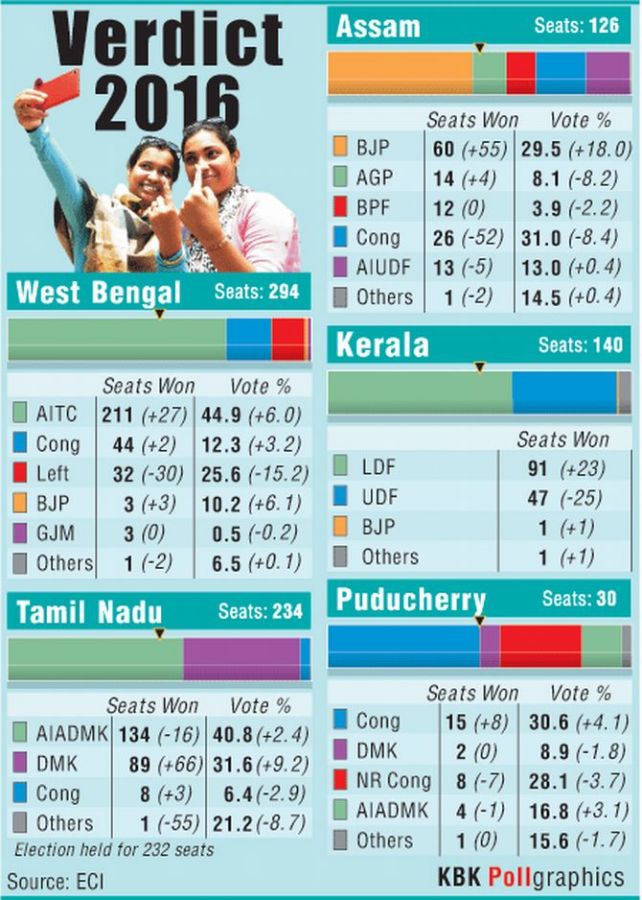 | « Back to article | Print this article |
 If the BJP or even the regional parties delude themselves that they are going to win the 2019 Lok Sabha election, then they are over-interpreting the assembly election results, says Kumar Ketkar.
If the BJP or even the regional parties delude themselves that they are going to win the 2019 Lok Sabha election, then they are over-interpreting the assembly election results, says Kumar Ketkar.
 If one goes by the media hype and instant panel analysts, then it is a total rout for the Congress party.
If one goes by the media hype and instant panel analysts, then it is a total rout for the Congress party.
Already, the television channel pundits have written the political obituaries of the Congress and its vice-president Rahul Gandhi.
The Congress lost two states -- Kerala and Assam -- and suffered a setback in the alliances it had made -- with the Communist Party of India-Marxist in West Bengal and with the Dravida Munnetra Kazhagam in Tamil Nadu. But that is only a partially true picture.
Yes, the Mamata Bannerjee-led Trinamool Congress could not be dislodged from power and the All India Anna Dravida Munnetra Kazhagam led by J Jayalalithaa retained power. But the brouhaha that the Bharatiya Janata Party is now invincible and the Congress is almost on the ventilator in the political ICU is a tendentious presentation of facts.
The actual comparative score card of the Congress and BJP from Thursday's assembly election results reads thus:
Kerala: Congress: 51. BJP 1.
West Bengal: Congress 42. BJP 4.
Assam: Congress 23. BJP 60.
Tamil Nadu: Congress 9. BJP 0.
Pudicherry: Congress 14. BJP 0.
Total seats (out of the 822 assembly seats in 5 states) won: Congress: 139. BJP 65.
If as the media thinks the real fight in India is between the BJP and Congress, then it is clear that the BJP is less than half of the Congress.
Then why is the impression being given that the BJP is a winner, when actually regional parties have won and the BJP has merely acquired Assam and entered the north-east? In Bengal, the BJP's vote share has fallen from 17% to 11%.
There is no organised conspiracy in the media, but the way television anchors orchestrated the theme of the demise of the Congress and the BJP's victorious march surely smacks of propaganda, either because of a lack of in-depth study of the results or because of writing 'history' in hurry.
Be that as it may, the question does remain: Whose defeat is it anyway?
From the point of acquiring political power, it can be considered a loss to the Congress because of the loss of power in Kerala and Assam, but in terms of numbers, the BJP has suffered.
Notwithstanding the hyper propaganda of the Great BJP Victory, the party is aware that the victory in Assam is more a burden than an advantage. Now the promise of sending millions of Bangladeshi refugees back has to be fulfilled or else there would be a dangerous backlash.
The major thrust of the BJP's electoral campaign in Assam was the Bangladeshi refugees and the cut-off date for sending them back. That is a propaganda point to polarise voters, but easier shouted than actually implemented.
When the 2014 Lok Sabha election was fought with the wild campaign from promising to bring Rs 75 lakh crore (or some such astronomical imaginary figure) and depositing Rs 15 lakh in every Indian's bank account or generating 20 million jobs a year, the promises will haunt the party and its leaders who came to power.
The Lok Sabha election is still three years away and it is too early to declare the arrival of a new permanent phenomenon of the Bharatiya Janata Party. Unless the performance matches the polls, it would be difficult, even in the states, to declare a winner.
It is not a one-day match. It is a Test series, which will conclude in 2019.
In 2015, the BJP lost the assembly elections in Delhi and Bihar and hence needed to show that the party was not on the decline. In that context, the BJP has something to show with Thursday's election results.
But if the BJP or even the regional parties delude themselves that they are going to win the Test series, then they are over-interpreting the results.
The glow of the cream starts fading when the heat hits the face.
Kumar Ketkar, the well-known political commentator, has followed the ebb and flow of Indian politics for close to half a century.